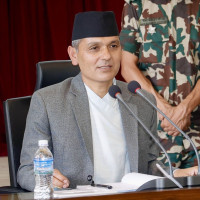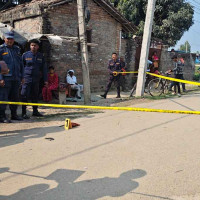- Friday, 20 February 2026
Promoting Pain Relief Services
Healthcare services are one of the facilities the state should manage effectively for the promotion of good health among its citizens. In this day and age, there has been much progress in the field of healthcare. But new health ailments are cropping up and old diseases are reappearing, posing challenges to the medical field. Despite remarkable advances in the medical field, there are some diseases which modern medical science has not been able to cure. Such terminal diseases are irresponsive to any kind of curative treatment. People suffering from such diseases need palliative care so that they can live their remaining life amid encouraging support from family and caregivers.
Palliative care is a holistic approach that involves taking care of patients with incurable diseases through management of pain and other distressing symptoms and end-of-life care with support from family and caregivers alike. Palliative care comes in handy when treatment is impossible or all available options of treatment are exhausted.
The concept of palliative care emerged in the 1960s with the objective of managing pain and meeting end-of-life needs of patients. A decade later, it was expanded to include psychosocial and spiritual care. In the 1980s, palliative care became a separate speciality and was subsumed under general medicine. In the past, palliative care was delivered to patients with incurable cancer. Now, palliative care is also administered to patients with other serious diseases such as serious heart failure, chronic obstructive pulmonary disease (COPD) and multiple sclerosis. What is more, palliative care is not now restricted to patients with terminal illness; it can be given at any stage of serious illness.
Challenges
Palliative care services emerged in Nepal in the 1990s with the joint efforts of the government and non-governmental organisations (NGOs). Palliative care for cancer patients began in 1991 with the establishment of the Department of Oncology at Bir Hospital. Likewise, the first cancer hospital, B.P. Koirala Memorial Cancer Hospital, was established in Bharatpur in 1992 for both curative and palliative treatment. Various public and private hospitals also provide palliative care services in different parts of the country.
Non-communicable diseases (NCDs) like cancer are rapidly growing in the present-day world. Every year, 18 million people catch cancer and the disease causes 10 million deaths. Final-stage cancer is often incurable. People do not often know whether they have cancer or not when it is in the initial stage. Patients with final-stage cancer need palliative care to relieve pain and improve the quality of life. Reports from several low-income countries show that eighty per cent of end-stage cancer patients have to experience moderate to excruciating pain that may last up to 90 days. It is reported that as many as 40 million people around the world require palliative care, out of whom 78 per cent are from low- and middle-income countries. Only 30 countries around the world are equipped with advanced palliative care services. Least developed and developing countries, Nepal included, have a long way to go when it comes to bettering palliative care services.
On the basis of various dimensions, Nepal is currently categorised under Category 3a with isolated care provision. This means the condition of palliative care is not sound. The services are not well-supported by the government and the entities concerned. There is heavy dependence on donors for funding. The availability of morphine is limited. Morphine is a drug that is widely used in palliative care. The drug, an analgesic, is effective at alleviating pain. And the services are not adequate considering the size of the population.
There are numerous challenges that must be overcome to improve palliative care services such as a limited number of palliative care centres, a paucity of resources, lack of expertise and lack of awareness among the public and health workers, among others. Palliative care and pain relief are essential components of Universal Health Care. In Nepal’s Public Health Service Act, 2018, the definition of health services also encompasses palliative care services. As per the Act, health services include retributive, promotional, diagnostic, remedial, rehabilitative and palliative services provided based on modern treatment (allopathy), Ayurveda, homoeopathy, Unani, natural treatment, acupuncture and Sowarigpa (Amchi) treatment systems.
Training
Palliative care services are concentrated in the Kathmandu Valley. Such services need to be expanded to every nook and cranny of the country. Various hospitals, both government and private, should set up separate units for palliative care services if they have none. Doctors, nurses and volunteers can provide palliative care services after they have been properly trained. Mid-level health workers in government services such as health assistants and auxiliary health workers are major service providers in rural areas. They can be mobilised in palliative care services but they need training. Likewise, female community health volunteers (FCHVs), who are primarily involved in maternal and child health services, can be trained in palliative care. Oncologists are specialists in cancer. They can deliver palliative cares services effectively. Apart from oncologists, internal medicine physicians, anaesthetists and general practitioners can also be trained in palliative care.
In the context of the importance of palliative care services growing day by day, the government should pay assiduous attention to improving and expanding the services. In this regard, support can be elicited from various NGOs. National guidelines on health services should be implemented both in spirit and letter. Moreover, palliative care should be integrated into primary healthcare. In resource-strapped countries like Nepal, palliative care is possible with the active involvement of trained community volunteers and families. Local resources can be harnessed for home-based, community-based or outpatient clinic-based palliative care. Expansion of and improvement in palliative care services would help patients needing such care enjoy the quality of life and even relieve their families of the stress and tension they may be undergoing.
(Maharjan has been regularly writing on contemporary issues for this daily since 2000.)














